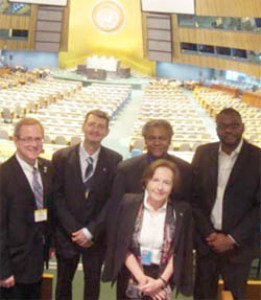Jun 6 2013
Optics and photonics leaders from around the world including President-Elect Philip Stahl of SPIE, the international society for optics and photonics, last month presented the widely supported "International Year of Light" (IYOL) proposal to representatives from United Nations (UN) Member States and the United Nations Educational, Scientific and Cultural Organization (UNESCO) at the UN Headquarters in New York.
 At the UN Headquarters in New York, the IYOL was presented by Ana María Cetto and (back row from left ) Philip Stahl, John Dudley, Anthony Johnson and Yanne Chembo Kouomou.
At the UN Headquarters in New York, the IYOL was presented by Ana María Cetto and (back row from left ) Philip Stahl, John Dudley, Anthony Johnson and Yanne Chembo Kouomou.
The 16 May meeting was hosted by the Permanent Mission of Mexico to the UN, which, along with Ghana, New Zealand, and the Russian Federation, submitted the original IYOL proposal to the UNESCO Executive Board in October 2012. Following that board's adoption of the proposed resolution, 30 more countries became cosignatories.
With UNESCO endorsement for the IYOL and last month's meeting, the proposal will now move forward towards consideration for adoption by the UN General Assembly.
"The optics and photonics community certainly knows of the importance of light and light-based technology," said Dr. Stahl, a member of the IYOL Advisory Board. "Light underpins the world economy, enables a sustainable future, offers tremendous advances in human health and medicine, and inspires us to appreciate the beauty of our natural world and human culture. But these contributions are often invisible to the policy makers of the world and the general public. The UN declaring an International Year of Light willl help make light more visible and increase its appreciation."
The delegation of senior researchers in New York also included Ana María Cetto from the National Autonomous University of Mexico (UNAM); Yanne Chembo Kouomou from the African Physical Society; John Dudley of the Université de Franche-Comté, President of the European Physical Society; and Anthony Johnson of the University of Maryland, Baltimore County, Past-President of The Optical Society and representative of ICTP, the International Centre for Theoretical Physics.
The group addressed the goals and activities of the IYOL, focusing specifically on the role that optics and photonics can play in addressing issues of sustainable development and in promoting science education. Delegates also noted emerging applications in archaeology and cultural heritage, and described the cross-cutting nature of the IYOL themes in diverse other areas from art to philosophy.
"Through this action, the United Nations has joined in advocacy of the profound importance of light in every facet of life," said SPIE CEO Eugene Arthurs. "SPIE is continually working to raise awareness of photonics technology, the many high-value jobs it creates, its numerous applications that already have revolutionized our world, and future applications that will solve pressing problems in communications, healthcare, food and water resource management, and other vital areas."
An important outcome of the meeting was the decision to ensure that the IYOL highlights both the science and the technological applications of light, emphasizing the key role of photonics as an enabling technology to solve problems of global concern.
As Professor Dudley explained "An International Year of Light is a tremendous opportunity to ensure that international policymakers and stakeholders are made aware of the problem-solving potential of light technology. Photonics provides practical and cost-effective solutions to challenges in so many different areas: energy, sustainable development, climate change, health and agriculture."
From SPIE, Dr. Arthurs and Stahl have served on the international advisory board for the IYOL Steering Committee along with SPIE Immediate Past President Eustace Dereniak (University of Arizona), SPIE Past President Katarina Svanberg (Lund University Hospital), and SPIE Fellow Maria Calvo (Universidad Complutense de Madrid). SPIE Member Angela Guzman (Florida Atlantic University) and SPIE Fellow Chris Dainty (National University of Ireland) serve on the steering committee.
SPIE is the international society for optics and photonics, a not-for-profit organization founded in 1955 to advance light-based technologies. The Society serves nearly 235,000 constituents from approximately 155 countries, offering conferences, continuing education, books, journals, and a digital library in support of interdisciplinary information exchange, professional networking, and patent precedent. SPIE provided over $3.2 million in support of education and outreach programs in 2012.